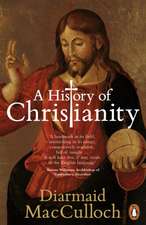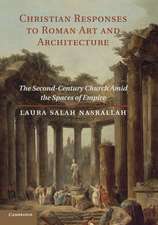Women Religious Leaders in Japan's Christian Century, 1549-1650: Women and Gender in the Early Modern World
Autor Haruko Nawata Warden Limba Engleză Hardback – 23 mar 2009
Din seria Women and Gender in the Early Modern World
-
 Preț: 225.10 lei
Preț: 225.10 lei - 19%
 Preț: 364.64 lei
Preț: 364.64 lei - 9%
 Preț: 1003.31 lei
Preț: 1003.31 lei -
 Preț: 289.10 lei
Preț: 289.10 lei - 8%
 Preț: 397.61 lei
Preț: 397.61 lei - 18%
 Preț: 1054.71 lei
Preț: 1054.71 lei - 18%
 Preț: 1004.68 lei
Preț: 1004.68 lei - 18%
 Preț: 1054.71 lei
Preț: 1054.71 lei - 18%
 Preț: 1055.06 lei
Preț: 1055.06 lei - 26%
 Preț: 764.20 lei
Preț: 764.20 lei - 26%
 Preț: 764.20 lei
Preț: 764.20 lei - 18%
 Preț: 1001.84 lei
Preț: 1001.84 lei - 18%
 Preț: 1000.27 lei
Preț: 1000.27 lei - 25%
 Preț: 497.08 lei
Preț: 497.08 lei - 18%
 Preț: 1000.27 lei
Preț: 1000.27 lei -
 Preț: 369.73 lei
Preț: 369.73 lei - 18%
 Preț: 1056.63 lei
Preț: 1056.63 lei - 28%
 Preț: 826.01 lei
Preț: 826.01 lei - 18%
 Preț: 1053.92 lei
Preț: 1053.92 lei - 25%
 Preț: 768.30 lei
Preț: 768.30 lei - 28%
 Preț: 819.48 lei
Preț: 819.48 lei - 18%
 Preț: 1113.63 lei
Preț: 1113.63 lei - 25%
 Preț: 767.07 lei
Preț: 767.07 lei - 31%
 Preț: 766.99 lei
Preț: 766.99 lei - 18%
 Preț: 1058.69 lei
Preț: 1058.69 lei -
 Preț: 369.73 lei
Preț: 369.73 lei - 16%
 Preț: 234.90 lei
Preț: 234.90 lei - 18%
 Preț: 1061.81 lei
Preț: 1061.81 lei - 31%
 Preț: 766.85 lei
Preț: 766.85 lei - 18%
 Preț: 1060.25 lei
Preț: 1060.25 lei - 28%
 Preț: 735.34 lei
Preț: 735.34 lei - 18%
 Preț: 1000.27 lei
Preț: 1000.27 lei - 18%
 Preț: 1061.81 lei
Preț: 1061.81 lei - 18%
 Preț: 1061.06 lei
Preț: 1061.06 lei - 28%
 Preț: 876.07 lei
Preț: 876.07 lei - 18%
 Preț: 1107.61 lei
Preț: 1107.61 lei - 26%
 Preț: 736.38 lei
Preț: 736.38 lei - 18%
 Preț: 1068.15 lei
Preț: 1068.15 lei - 18%
 Preț: 1061.06 lei
Preț: 1061.06 lei - 18%
 Preț: 1000.76 lei
Preț: 1000.76 lei - 26%
 Preț: 819.84 lei
Preț: 819.84 lei - 18%
 Preț: 1109.18 lei
Preț: 1109.18 lei - 28%
 Preț: 821.53 lei
Preț: 821.53 lei - 18%
 Preț: 1000.27 lei
Preț: 1000.27 lei - 28%
 Preț: 827.75 lei
Preț: 827.75 lei - 18%
 Preț: 1122.62 lei
Preț: 1122.62 lei
Preț: 1064.70 lei
Preț vechi: 1298.42 lei
-18% Nou
Puncte Express: 1597
Preț estimativ în valută:
203.72€ • 213.28$ • 168.57£
203.72€ • 213.28$ • 168.57£
Carte tipărită la comandă
Livrare economică 05-19 aprilie
Preluare comenzi: 021 569.72.76
Specificații
ISBN-13: 9780754664789
ISBN-10: 0754664783
Pagini: 422
Dimensiuni: 156 x 234 x 30 mm
Greutate: 0.74 kg
Ediția:1
Editura: Taylor & Francis
Colecția Routledge
Seria Women and Gender in the Early Modern World
Locul publicării:Oxford, United Kingdom
ISBN-10: 0754664783
Pagini: 422
Dimensiuni: 156 x 234 x 30 mm
Greutate: 0.74 kg
Ediția:1
Editura: Taylor & Francis
Colecția Routledge
Seria Women and Gender in the Early Modern World
Locul publicării:Oxford, United Kingdom
Cuprins
Contents: Introduction; Part 1 Nuns: Preface to Part 1; Hibaya Monica (c.1549-c.1577): Virgem of Sakai; Naito Julia (c.1566-28 March 1627): Superiora; The beatas of Manila (1615-1656): visionaries; Epilogue to Part 1. Part 2 Witches: Preface to Part 2; Otomo-Nata Jezebel (d. 15 February 1587): priestess of Hachiman; Marriage and divorce in Catholic Japan: Otomo Sorin and his marital conflict; Jezebel the witch; Jezebel versus the Church (1577-1587); Epilogue to Part 2. Part 3 Women Catechists: Preface to Part 3; Hosokawa Tama Gracia (1563-25 August 1600): scholar-teacher; The women catechists; Tama Gracia in the network of women against abuse; Releasing Kirishitan women apostles from captivity; Epilogue to Part 3. Part 4 Sisters: Preface to Part 4; Justa of Nagasaki and the sisters of the Misericórdia; Elder women of the Marian confrarias; Epilogue to Part 4; Conclusion; Glossary; Bibliography; Index.
Notă biografică
Haruko Ward is Associate Professor of Church History at Columbia Theological Seminary, USA.
Recenzii
'An amazingly learned, well-researched, and in-depth look at women’s religious activities in the "Christian Century" in Japan, including leaders in the Zen Buddhist and Shinto traditions as well as the Japanese women who became Christian teachers and catechists. The book gives a human face to the story of cultural encounters and religious conversion, explores women’s activities within and in opposition to Christianity from a global perspective, and offers a startling new explanation for the "closing" of Japan to the West.' Merry Wiesner-Hanks, University of Wisconsin-Milwaukee, USA 'A monumental achievement! Haruko Ward has revealed a century of forgotten lives and given voice and agency to religious leaders who have been absent too long from our histories. She has shown us, in all their variety and complexity, the female leaders who transgressed and transformed Japan's religious culture. This is more than a history of women or a history of religion. It is a book that will change the way that we think about a crucial and transitional age in the history of Japan.' D. Max Moerman, Columbia University, USA 'Haruko Ward's new book on the unique role played by women in evangelization in early modern Japan breaks new ground in the study of Christian missions in East Asia. Based on an extensive knowledge of primary sources in a number of languages, it is an impressive piece of original scholarship and will become an important reference work for further research.' M. Antoni J. Üçerler, S.J., Campion Hall, Oxford, UK ’This very readable volume represents an extraordinary degree of scholarship, drawing on original sources in Portuguese, Japanese and Latin, with secondary material also in German, and working with theoretical and analytic tools from disciplines including history, feminism, theology and ethnology.’ Parergon ’This work is a valuable contribution to the history of Christian missionary activity in Asia and to women’s studies. It joins a growing n
Descriere
Meticulously researched and drawing on original source materials written in eight different languages, this study fills a lacuna in the historiography of Christianity in Japan. Ward analyzes the experience of nuns, witches, catechists and sisters in sixteenth-century Japan, bringing to light how these women utilized resources from their traditional religions to new Christian adaptations and specific religio-social issues, creating unique hybrids of Catholicism and Buddhism, or rejecting the new religion.















